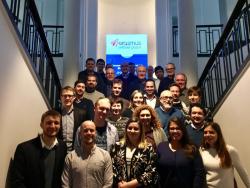As you may know, the project came to an official end on 31st December 2019. That is the sad news. The good news is that the Steering Committee has decided to continue functioning for at least an additional six months on a voluntary basis. This means we extend the project activities, but without new funding. We already had 2 Steering Committee meetings in January and February and we are having another one at the beginning of March. In six months’ time, we hope to have a new and different situation, but for the time being, we will keep working on the project objectives and go on working out and finalising what we set out to do in the project. In fact, we still intend to realise much more. Over the course of the project, several problems cropped up that have led us to define totally new solutions to unexpected problems.
In addition, a new project proposal has been submitted by EUF under the CEF TELECOM CALL For Proposals 2019. The proposed project is called the European Digital Student Service Infrastructure (EDSSI). It involves EWP, but it is about much more since it sets out to build an EU Student eCard core service platform by consolidating and integrating a range of ongoing digitalisation initiatives that are part of the European Commission’s European Student Card Initiative, of which EWP is a driving element. The result of the call should be known sometime late spring.
At the moment the EWP Steering Committee has just submitted the final reports (both financial and technical) and all the accompanying documents were due by the end of February 2020. The technical report detailed everything we have done and refer to all the deliverables. The financial report spells out all the expenses and provides links to all the corresponding proofs of payment.
The EWP project not only elaborated an extensive website but has also provided the core of a future help strategy (the Competence Centre), a detailed developer’s website and an EWP GitHub platform. GitHub is a project management and code versioning system as well as a code repository and network platform for developers. It allows developers to work collaboratively with other people around the world, plan new technical developments and track the work done on the EWP network. All EWP’s APIs are published on GitHub. EWP is also active on LinkedIn and on Twitter. Finally, there is also the Open Source University Alliance (OSUA), which is an open repository of source code and software. All of these tools are open to everyone.
So you can see that, although the official project has ended, we are still very busy and we expect especially all technical teams to continue implementing and finetuning the realised APIs. At the moment we are still putting the finishing touches on the final integration of OLA and the Mobility Tool+ APIs. The Interinstitutional Agreement Manager (IIAM) of UPorto is very close to being fully operational as part of the Erasmus+ Dashboard as well. The EC’s templates for the Interinstitutional Agreements in the new Erasmus Programme have just been made available.
More and more HEIs are requesting access to EWP. Many have already been included in the Development environment (DEV), which is a testing environment. In our production environment (PROD), we now have more than 300 HEIs that fulfil all requirements to be a full EWP partner, and more and more are added every day, not only clients of third-party providers but also individual HEIs who have their own SIS software. New third-party providers are also contacting us about implementation, and many are preparing the implementation of the first APIs. To be admitted to DEV, we need the URL of the manifest file of each user-HEI and it is also necessary to sign the Terms of Use Agreement (see the Competence Centre).
Even though we have many users in PROD, the actual number of data exchanges is still relatively low. We have noticed that there is a huge psychological threshold to going fully digital in HEIs, partly because going digital also implies extensively rethinking internal workflows and letting go of improvisation in favour of standardisation. From 2021, the EWP standards become mandatory in the new Erasmus programme, so HEIs need to take action now. Academic and administrative personnel (but also students) will have to push hard internally and also with their international partners to make the digital exchange of students and study data a reality in time.
Since the Steering Committee remains in operation, we will be able to keep reviewing and adapting to any new situations as before. In terms of communication, this means that we will continue to update our websites and information tools.
Having said all this, we would like to assure you all of our continued support. We have achieved great things in EWP despite changing conditions and contexts, and I am sure that EWP will continue to grow and prosper. Inevitably, we will have to look for synergies with other initiatives (as in the European Student Card Initiative), but there is no doubt that EWP has made its mark and will continue to do so.
I would like to thank everyone who has contributed directly and indirectly for their enthusiasm, determination and collaboration since the start of the project. It has been a very enriching and rewarding journey.
But remember, we may have ended a project, but we continue the process!
And if you have any remarks or suggestions, please don’t hesitate to contact us
Valère Meus, EWP coordinator
and the EWP Steering Committee.

